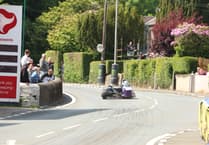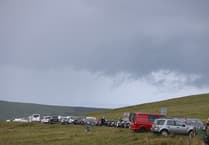Midwife sonographer Jenifer Jayne Reid talks to us about delivering babies on remote Scottish islands and why she wanted to bring a private pregnancy scan service to the Isle of Man.
Anyone with children will remember the excitement of going for their first scan: it’s hard to tell whether it’s a baby or a rather hazy cloud. It doesn’t matter, you just want to be reassured that a new life is there inside you and it has a heartbeat.
So it’s quite a surprise to go into ScanSanctuary, at the Follan Health Centre in Tromode, where Jenifer, or Jen as she likes to be called, has set up her clinic, and see, right in front of you a large screen filled with the completely distinguishable features of a baby’s face. In full colour.
’Our scans are different to the hospital scans,’ says Jen, ’and I do make it very clear to all of our clients that our scans should not replace their routine hospital ones’.
’The hospital scans are obviously for a medical purpose, whereas our scans are more about bonding and reassurance so they have a completely different purpose.’
Jen’s equipment gives very high resolution images in both 2D and 3/4D. 4D is 3D in real time, so seeing the baby is moving around inside you in three dimensions.
She explains that an image like the one I’m seeing would be a later pregnancy scan and how she has seen this become a joyful, bonding experience for families: ’It’s normally the first time that parents get to actually meet their baby and see what they look like and it can be a nice experience for other children or the wider family.
’We tend to get a great reaction from the older generation, many of whom haven’t seen a 3/4D scan before.’
’The best time to have a 3/4D scan is around 28 weeks.
’ We often see different facial expressions from the baby including smiling and frowning, see them yawn and swallow, and sometimes see them sucking their fingers or hands.’
’We often get a good response from men too, who sometimes are not that bothered initially about coming for the scan, but actually when they see their baby in 4D they say that they’re really glad that they came along and they feel a bit more bonded with baby.’
The other growing trend is for ’gender reveal’ gatherings, where family and friends learn the sex of the baby.
Jen has a wide range of accessories she can offer for this, including - yes you read it right - gender reveal scratch cards.
’She also sells cuddly toys into which can be placed an audio recording of the baby’s pulse as a special keepsake.
Jen says: ’We offer gender scans from 16 weeks. Many people nowadays want to find out their baby’s gender and gender reveal is quite big now, whereas previously it was more an American thing.’
Of course, pregnancy isn’t always a time of undiluted joy: the figures show that approximately one in four pregnancies ends in miscarriage, and pregnancy can be an anxious time for women who have experienced loss, or had problems previously.
Under normal circumstances, the NHS will routinely scan at 12 and 20 weeks but sometimes, women want a little more than that: ’Many women find out that they are pregnant as early as four to five weeks, and for them to wait another seven or eight weeks for a scan can be quite a long period of time, especially if they have experienced a miscarriage or previous complications.
’We offer early pregnancy scans from seven weeks, to try and help ease anxieties and put women’s mind at rest.’
’A big part of what we are about is supporting women, and our early pregnancy scans are very popular. Many women find the early stages of pregnancy a very anxious time, as they are not yet feeling movements from baby to reassure them and pregnancy symptoms often come and go, which can cause worry.
’The relief shown by women and often their partners, when they see that their pregnancy is progressing with a normal heartbeat, makes our job so worthwhile.’
’If we have any concerns about a scan, we have a referral pathway into Noble’s Hospital so we can directly refer clients to the appropriate department, where they would take over the care.’
Jen has been a qualified midwife for more than 15 years, and a Sonographer for 10 years.
She worked for many years in the NHS, not only as a midwife, but also as an early pregnancy specialist, and as a midwife sonographer in the antenatal clinic, performing growth scans.
Jen worked for two years at Noble’s Hospital, until 2017, before she decided to return to the UK and focus mainly on scanning, where she worked for two well-established professional private scan clinics as well as the NHS.
She says: ’I am very much about supporting women and families. I came to the Isle of Man because I grew up on a small island in Scotland, and I’ve got a passion for providing services to rural areas.’
’I used to work as a rural midwife in Argyll, Scotland, where we were a two hour drive from a large hospital.
’We covered some of the surrounding islands, and provided a home birth service.
’One of the islands was my home island, the Isle of Mull.
’If there were complications at a home birth there, women were transferred off island by an emergency helicopter, however the reliability of this service was very much weather dependant.
’It was myself and one other midwife at a home birth, and we had the backup of a local GP if required. Once, we had to deliver a baby on a tiny island near Oban.
’We had to travel there by RIB [boat] and when we got there we had to walk up the beach with all of our equipment as there were no main roads.
’This woman was deemed high risk and had been booked to go into hospital on the mainland but when her husband called us, we knew there was no time to transfer her.
’Myself and a colleague got there as soon as we could, the baby made a timely appearance, and all ended well. The neighbours were all waiting outside when we left and there was a great community spirit.’
Jen is used to working remotely, and is also aware of the limitations of this.
’She continues with her professional development by attending relevant conferences and courses, and is keen to keep herself up to date.
’She also remains in contact with one of the largest private scan providers in the UK, and plans to continue to do some work for them soon.
Jen says: ’Women in the Isle of Man used to have to travel to the UK to access the services that we now offer, and we are very pleased to be here and save them from this hassle and expense.
’We pride ourselves on being a professional clinic that runs in line with similar clinics in the UK.’
l For more information visit www.scansanctuary.com.
From previous page

.jpeg?width=209&height=140&crop=209:145,smart&quality=75)

.jpg?width=209&height=140&crop=209:145,smart&quality=75)

This article has no comments yet. Be the first to leave a comment.